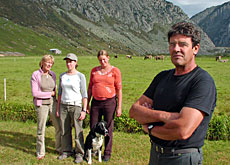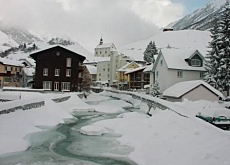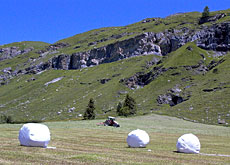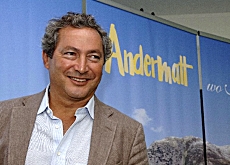Farmer David takes on tourism Goliath

Ambitious plans to build a luxury resort and golf course in the Swiss alpine village of Andermatt could sound the death knell for farming in the region.
One family is leading opposition to the latest plans for the golf course, which would swallow up the area’s choicest farmland, ending a way of life for many villagers.
Maja Regli stops her car at the highest point of a bridge. With a sweep of her arm she points to where the future golf course will be built. It will, she says, extend from one end of the fertile valley to the other.
The project, which has been billed as a lifeline for the economically-depressed village, was originally supposed to be limited to land occupied by a disused army firing range.
It seemed a win-win situation for everyone. The government was happy to sell the property, badly needed jobs would be created, and it was a chance for Egyptian tourism magnate, Samih Sawiris, to get a foothold in Europe.
The cantonal government, local authorities and a majority of the population spoke out in favour of the 800-room resort when Sawiris announced his plans at the end of last year.
But in July, Sawiris made it known he would need to purchase privately-owned farmland to build a bigger, world-class golf course, and earlier this month, that he would need even more.
He has given the landowners until the beginning of December to decide whether they want to sell. If not, the investor has threatened to pull the plug on the entire project.
Most of the 15 farming families affected have already said they will move or take jobs in the future resort.
But not the Reglis. Despite their general support for the project, they refuse to surrender land that has been farmed by Sebastian Regli’s family for generations.
Not at any price
The family says it is under no pressure from the local authorities or other villagers who may fear their obstinacy could torpedo the project. But they realise the deadline for a decision is looming.
Sebastian remains adamant that he will not sell out at any price. “I can relate to people who lose their jobs, who’ve done the same thing for years and suddenly have to do something that is beneath their dignity.”
He says farming will be relegated to the steep mountain slopes if the golf course is allowed to swallow up the best land.
Andermatt’s soul will also be lost, he fears. It is the cultivated mountain landscape shown on postcards, Sebastian is convinced, that makes the Alps so attractive for tourists.
“The project could turn Andermatt into the kind of place where they will have to acquire goats and herd them through the village to satisfy tourists,” he says, in a reference to a scheme used in Zermatt.
At stake for the Reglis is a 2.5-hectare parcel of fertile farmland where the family graze their 30 cattle.
Cows
“Mr Sawiris has always said he wished to see cows in the middle of the golf course, and if that’s not possible, he’ll just have to exempt a bit of farmland and leave it as it is,” says Maja defiantly. “If he doesn’t agree to those conditions then he is someone who doesn’t keep his word.”
The Reglis feel the local authorities have been steamrolled by Sawiris and have caved in to all of the investor’s demands, regardless of the impact on livelihoods.
Their 25-year-old daughter Caroline echoes her parents’ resolve, but is optimistic the Egyptian will keep his initial promise to keep cows beside the fairway.
She is toying with the idea of starting a cheese-making operation to make the farm attractive for the many tourists who will one day flock here.
“If I were to start making cheese, than I would need the land. There should be a farm in the middle of the golf course with a couple of cows wearing big bells,” she says.
swissinfo, Dale Bechtel in Andermatt
Andermatt has a population of 1,264, and lies at an altitude of 1,444 metres above sea level.
It has around 800 beds in around 20 hotels and guesthouses.
Samih Sawiris plans to double the figure with his resort.
The Sawiris business empire, the Orascom Group, is divided into three sectors: telecommunications, construction and tourism.
Samih Sawiris heads the latter, operating three purpose-built resorts on the Red Sea coast, and is constructing a fourth and fifth in the United Arab Emirates and in Oman.
The company’s strategy is “the acquisition of undeveloped land in prime locations, the development and marketing of fully self-sufficient communities…”
The flagship El Gouna resort is a cluster of hotels, restaurants and shopping centres built around artificial lagoons.
Orascom administers the resort with a resident population of 10,000, including its airport, schools and hospital.

In compliance with the JTI standards
More: SWI swissinfo.ch certified by the Journalism Trust Initiative













You can find an overview of ongoing debates with our journalists here . Please join us!
If you want to start a conversation about a topic raised in this article or want to report factual errors, email us at english@swissinfo.ch.